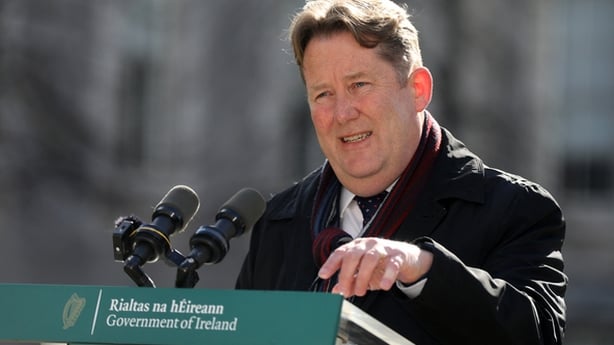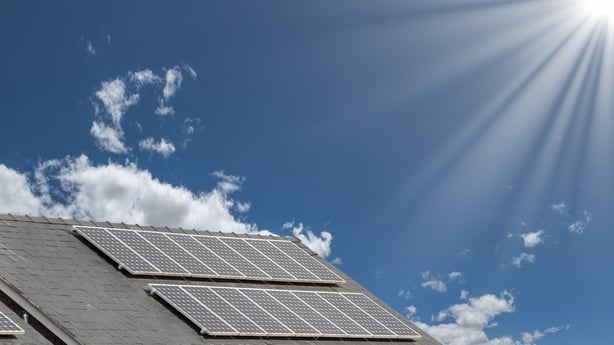The Cabinet was told that there has been a 70% fall in the number of International Protection applicants arriving into Ireland from so-called safe countries since November.
Minister for Justice Helen McEntee informed her colleagues that the sharp decrease follows her introduction of new processes last year.
Safe countries of origin are countries where it can it can be shown that there is generally and consistently no persecution, no torture or inhuman or degrading treatment or punishment and no threat by reason of indiscriminate violence in situations of international or internal armed conflict.
The countries are Albania; Bosnia and Herzegovina; Georgia; Kosovo; Macedonia (Former Yugoslav Republic of); Montenegro; Serbia; and South Africa.
The minister's changes were designed to ensure a first instance decision was made within three months in such cases - a significant reduction from a norm of 17 to 24 months last year.
Since last November, the numbers arriving from these countries have decreased from 210 applications in November to 64 in May this year.
Minister McEntee provided the details as part of a memo to Government on the modernisation of the International Protection Office.
The IPO is already achieving 750 decisions per month now, and the aim is to increase this further.
Staffing in the IPO has increased significantly due to funding increases agreed in the last Budget.
At the end of June, a total of 344 staff were assigned to the IPO, which is an increase of 201 from 143 in 2019, and the intention is 430 staff will be working by the end of the year.
'Pause' on sea bed mining
Tánaiste Micheál Martin and Minister for Local Government Darragh O'Brien jointly sought approval from Cabinet for Ireland to join other states in calling for a "precautionary pause" on deep-sea mining on the international seabed.
Under the 1982 UN Convention on the Law of the Sea, the mineral resources of the deep seabed beyond national jurisdictions are vested in mankind as a whole.
The convention established the International Seabed Authority to regulate exploration and exploitation of mineral resources on the international seabed.
However, there are efforts by some states and the mining industry to begin exploiting these resources, despite the fact negotiations on a mining code, including environmental regulations, are expected to take a number of years to complete.
A growing number of countries, including EU partners, are calling for a "precautionary pause" of deep-sea mining on the international seabed in order to better understand the effects of deep-sea mining on the marine environment and biodiversity.
Ireland will send a delegation to the annual meeting of the ISA in July, and in advance of this it is proposed that the Government announce support for a "precautionary pause".
Deep-sea mining operations are those that typically occur below depths of 200 metres and are focused on the extraction of cobalt, manganese, nickel, gold, silver, copper and zinc.
Environmental impacts of recovery, disposal of waste material and resulting ecosystem damage differ depending on the type of deposit to be extracted.
Although no mineral exploration or mining activity is envisaged on the Irish seabed, nor is any Irish company engaged in seabed mining activity, as a party to the 1982 convention, Ireland is a member of the ISA.
The State will participate at annual meetings of the ISA Council and Assembly in July.
To date, those calling for some form of precautionary pause on seabed mining include Belgium, Chile, Costa Rica, Dominican Republic, Ecuador, Federated States of Micronesia, Finland, Fiji, France, Germany, Federated States of Micronesia, Monaco, New Zealand, Palau, Panama, Portugal, Spain, Vanuatu and the European Commission.
A number of these countries, led by France, have issued a declaration calling for a "Partnership for the Deep Sea" which takes the position that mining activities in the international seabed should not be allowed to commence before adequate rules, regulations and procedures are in place.
The Programme for Government in Ireland commits to expanding Ireland's network of Marine Protected Areas to 10% of its maritime area as soon as is practical, and 30% coverage by 2030.
Supporting a precautionary pause in deep-sea mining in the international seabed is therefore consistent with existing policies being pursued by the State at national and international level.
Properties ring-fenced for individual buyers

Mr O'Brien, as Minister for Housing, also updated Cabinet on a planning condition he introduced two years ago to prevent the bulk sale of houses and duplexes.
It is understood the minister said that 31,000 houses and duplexes were ring-fenced for individual buyers, and restricted from bulk buying or multiple sales to a single purchaser.
The 31,000 figure relates to planning permissions that were granted with the minister's condition, but it is not known how many homes or duplexes have either commenced or been completed.
In May 2021, the minister issued a circular under Section 28 of the Planning and Development Act, which he maintained "fundamentally bans bulk sales for houses and duplexes for all new applications".
At the same Cabinet meeting, it was decided that the bulk purchase of ten houses or more would be subject to a 10% stamp duty.
Minister for Public Expenditure Paschal Donohoe said this was intended to "provide a very significant disincentive" to the practice of multiple purchase of large parts of housing estates before they reached the market.
However Opposition parties were critical of both measures.
Sinn Féin's Housing Spokesperson Eoin Ó Broin argued at the time that apartments should have been included in Minister O'Brien's planning condition and he contended that the 10% stamp duty did not go far enough.
Social Democrats Housing Spokesperson Cian O'Callaghan said the Government was adopting the wrong strategy when it comes to tackling investment funds, arguing that reducing rents, rather than hiking stamp duty, would have a greater impact.
Solar panel grants for businesses

Grants up of €162,500 are to be offered to businesses to install rooftop solar panels under a plan brought to Cabinet by Minister for the Environment Eamon Ryan and Minister for Enterprise Simon Coveney.
The stated aim of the memo is to greatly enhance and extend the range of supports available for the installation of solar for business and ramp-up what is termed "the solar revolution".
The new tiered grant system will range from €2,700 up to €162,500 to support the installation of solar PV, and associated smart energy infrastructure, for a wide range of commercial and public sector non-residential buildings.
It will support PV installations ranging from 7kWp [kilowatt peak], suitable to the energy capacity of smaller SMEs or professional businesses like solicitors or dentists, up to 1 MW, which might be more suitable to the energy capacity of larger businesses like a pharmaceutical plant or a large retail outlet.
The memo says that grants will come into effect quickly so that businesses can install solar panels early to offset energy costs.
The new scheme will be in place until the end of 2025 at least.
Up to now, grants for solar PV have been capped at 6KWp, or about 16 PV panels, more suited to domestic houses and farms.
This means that businesses which may have wanted to install 7KWp, for example, received no grant whatsoever.
To date, nearly 60,000 homes have availed of Government grants for solar.
In addition to saving businesses money on their energy bills, the Government expects that the targeted uptake of this new Solar for Business scheme will also help avoid nearly 80 MtCO2 [metric tonne of carbon dioxide equivalent] in emissions over the coming two years.







